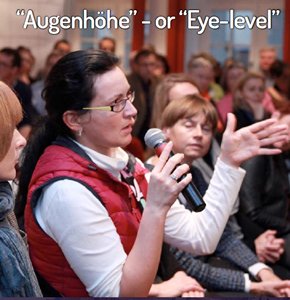Ulf Brandes is one of the creators of the documentary Augenhöhe – German for “Eye-level”. Augenhöhe shows what it’s like to work “at eye-level” in organizations with new ways of collaborating that fit the 21st century. Augenhöhe is meant to invite people to dialogue: How are they working now, and what would they like to change? How can they change?
But the making of the documentary is interesting as well. Meet Ulf Brandes, a 45-year old entrepreneur from Berlin, who created this movie with Daniel Trebien, Philipp Hansen, Silke Luinstra, and Sven Franke. “This is my dream: I want as many employees as possible to see this documentary. Preferably at work, with leaders and coworkers. I’d like to invite them to talk about their work culture and collaboration.”
Marcella Bremer: How did the movie project Augenhöhe start?
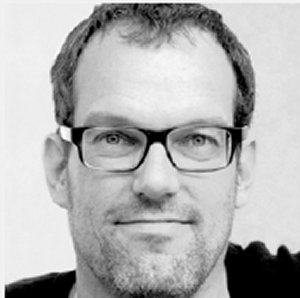 Ulf Brandes: It started when I sketched my book “Management Y”, a guidebook with reports from many people about different ways to initiate cultural change. I asked organizations what worked for them and what had helped them shift mindsets. I did many workshops with people for this book, to ask for specific observations of “21st-century cultures” at work. The focus on actual observations helped to describe the new ways to collaborate beyond just buzz words.
Ulf Brandes: It started when I sketched my book “Management Y”, a guidebook with reports from many people about different ways to initiate cultural change. I asked organizations what worked for them and what had helped them shift mindsets. I did many workshops with people for this book, to ask for specific observations of “21st-century cultures” at work. The focus on actual observations helped to describe the new ways to collaborate beyond just buzz words.
One of the workshops was in a big open space event in Berlin in December 2013, about developing a “21st-century manifest”. During that event, Daniel suggested: if 21st-century behavior at work can be observed, can’t I be filmed? Can we capture and show 21st-century collaboration at work? So we spontaneously did another workshop that focused on this question and explored the possibility of making a film. Then Philipp shared that he knew the owner of a progressive company – and called him if we could film there. So, the project began.
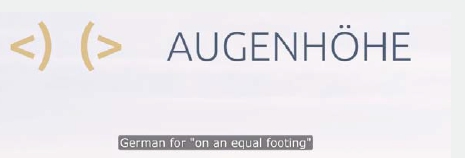 The company, metalworking firm Allsafe Jungfalk with 170 employees, wanted to read an outline of our idea first. Over Christmas, Daniel and Philipp wrote a first draft that we completed together within a few weeks. Then the magic happened. Detlef Lohmann sent us a one-line email with permission to film his firm.
The company, metalworking firm Allsafe Jungfalk with 170 employees, wanted to read an outline of our idea first. Over Christmas, Daniel and Philipp wrote a first draft that we completed together within a few weeks. Then the magic happened. Detlef Lohmann sent us a one-line email with permission to film his firm.
We packed our bags and cameras, and two weeks later we were in a large manufacturing company in Southern Germany. We wanted to be empathic observers, not intruders; at eye-level with all employees. We wondered how we’d communicate with people and bond with them, without disturbing their work? In a way, our role model for this was Heinz Sielmann, the famous German filmmaker who recorded wildlife in Africa. We wanted to film at the waterholes like he did!
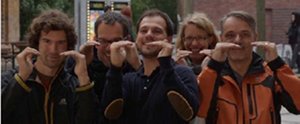 So, the first day we organized a workshop with employees who were interested – to explain what we were aiming for. We asked them questions to find the sweet spots, to explore what made this company a joy to work for: What was your magic moment at the company? What do you tell your friends about working here? We interviewed many people and found ways to make ourselves as unobtrusive as possible. We managed to record an applicant’s interview, the annual strategy meeting and a negotiation with a business partner.
So, the first day we organized a workshop with employees who were interested – to explain what we were aiming for. We asked them questions to find the sweet spots, to explore what made this company a joy to work for: What was your magic moment at the company? What do you tell your friends about working here? We interviewed many people and found ways to make ourselves as unobtrusive as possible. We managed to record an applicant’s interview, the annual strategy meeting and a negotiation with a business partner.
Seeing is believing
Ulf Brandes: The movie is meant to encourage the audience and shows that it’s possible to work in a different way. Many people have pretty rigid ideas of what work has to be like. We struggle with issues like dominance and obedience. Bosses need to be bossy; employees have duties. We have hidden beliefs like: “If I don’t suffer I don’t work hard enough.”
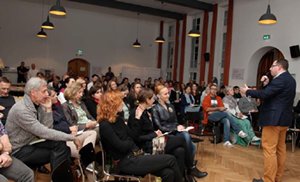 In the 21st century, isn’t it much more important for people to be themselves, and to tap their true potential? I believe: Seeing is believing! Many people can hardly believe that work can be different. So we want to show them what’s possible and create a societal effect as well, when people say: I want that culture, too!
In the 21st century, isn’t it much more important for people to be themselves, and to tap their true potential? I believe: Seeing is believing! Many people can hardly believe that work can be different. So we want to show them what’s possible and create a societal effect as well, when people say: I want that culture, too!
Many CEOs say they have a great workplace, but what touched me was to see workers or service staff feel empowered and respected. How their faces beam, knowing: “I can contribute a lot, the way I am.” When you watch the film without sound, you can tell from the body language of people that their workplace is different.
Marcella Bremer: So Augenhöhe was conceived and created in only a year?
Ulf Brandes: More or less. We had an agile mindset and checked: How do we test, how can we learn fast? After recording the first company, we created a trailer and tested on social media how people responded. That was so encouraging! People wanted to see more of it. We knew a couple of great companies in classic industries that people can easily relate to, like an engineering firm with 170 employees and 7 locations. We wanted to show diverse organizations that the audience could identify with. They should not easily reject the eye-level concept, like: “Ah, that may work at progressive IT-start-ups, but my firm is different of course”.
All organizations we asked, agreed. Only the German drugstore chain DM hesitated because they were overloaded with requests like this. A pity, they are rightfully famous for their culture – which is great for a company their size.
The feedback of the first company was encouraging. They said: “Your filming does something to us in a positive way. You hold up a mirror for us and invite us to reflect on our culture.”
All organizations we filmed, found it productive – as if culture consultants had been on site – but without actually intervening with an explicit intention to change something.
Making the film took a lot of time and effort. Not just the actual filming and editing, but all the other questions that we needed to deal with: How can we make the film accessible to as many people as possible? How do we interact with the growing community? How do we keep people posted via social media? Most of us have families. I have three children for instance. Would I rather spend time on this project than spend time with them…? So we started to think about funding.
It started from the passion of the Berlin open space event, then we added the spark of social media, and crowdfunding was the next step.
Marcella Bremer: In the meantime, how did you pay your bills?
Ulf Brandes: Philip is a student, and all others are freelancers, so we could free up the time to do the film as a part time project. I have worked in management for nearly 20 years, with Procter & Gamble, Ebay, and as co-founder of several start-ups where I have been infected with the agile mindset, and as a self-employed trainer, researcher and consultant.
In the course of doing my assignments, I started to ask myself questions. It was great to help organizations improve with Scrum and other approaches – but what was the purpose of the organizations I was serving?
Then I started this experiment: I only want to do what I believe in. I only engage with clients whose mission I support. I finished commitments that were not aligned with that resolution. I started to write my book, Management Y. It was a bit scary because I didn’t know where this journey would lead, but also enriching because I felt so much caring by our social community. It felt like the right journey.
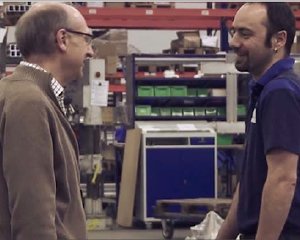 I found the courage to decline consulting projects and focus on my book and the movie because I had saved money to buy a house. I decided that it would be better to invest this money in an enterprise of some sort. Rather than invest in safety and security, I was ready to shift gears and invest in myself and purpose. I completed the book that was published in September 2014 at Campus, a leading German publisher. It’s been a great synergy with the film, as two of the companies we filmed also contributed to the book, as well as many other organizations that have changed their collaborative culture and created great workplaces.
I found the courage to decline consulting projects and focus on my book and the movie because I had saved money to buy a house. I decided that it would be better to invest this money in an enterprise of some sort. Rather than invest in safety and security, I was ready to shift gears and invest in myself and purpose. I completed the book that was published in September 2014 at Campus, a leading German publisher. It’s been a great synergy with the film, as two of the companies we filmed also contributed to the book, as well as many other organizations that have changed their collaborative culture and created great workplaces.
Crowdfunding takes a lot of time and energy, and Sven got engaged with it. Silke called many companies directly to ask them to fund the movie. Many organizations and entrepreneurs did – because they wanted to support this movement and show their commitment. The momentum was great. Our film turned out to be one of the best-crowd-funded documentary films. When you add up our work hours, the funding was at a pretty low hourly rate, but we could, at least, justify to our families what we did.
Money wasn’t the key trigger for us anyway. It’s just been so uplifting to feel the enormous support from so many people. Some people went as far as organizing public screenings of the movie even before they had seen the film themselves like the Berlin Change Days did in November 2014. All of us invested lots of energy in promoting it. The premiere was in Hamburg, end of January 2015. 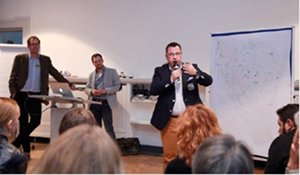
Augehöhe film and dialogue
Ulf Brandes: If you watch the film in leaning-back consumption mode, you get only half of the energy. We wanted to get the audience engaged with each other about what the film. In our experience, with dialogue formats like a “world-café” or a “fish bowl,” people have much more meaningful conversations and become active: You share what you feel, experience or imagine – and how you can bring what you’ve seen in your work contexts.
During the first weeks after the premiere, I facilitated a few “fish bowl” gatherings for some of the film screenings 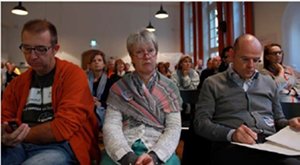 that I wanted to support. After watching the movie, we created an inner and outer circle for the audience. In the inner circle (the “fish bowl”) four empty chairs invite people to start a dialogue; all others sit in the outer circle and can step in whenever they feel like it. If the inner circle is full, you can tap someone who’s “in” on the shoulder, take their seat, and join the conversation that happens only inside the fish bowl, while all others listen. This way, dialogue evolves very naturally, with the conversation following a collective intention, instead of following a script or a moderator.
that I wanted to support. After watching the movie, we created an inner and outer circle for the audience. In the inner circle (the “fish bowl”) four empty chairs invite people to start a dialogue; all others sit in the outer circle and can step in whenever they feel like it. If the inner circle is full, you can tap someone who’s “in” on the shoulder, take their seat, and join the conversation that happens only inside the fish bowl, while all others listen. This way, dialogue evolves very naturally, with the conversation following a collective intention, instead of following a script or a moderator.
With “Art of Hosting” dialogue formats like this, we had touching moments when people shared their workplace experiences as leaders and co-workers, and what it meant to them to consider working “Auf Augenhöhe”. Some made commitments like changing how they collaborated, or showing the film at work, and so on. That’s my dream. I want as many company owners, leaders and employees as possible to see this movie, and start conversations about organizing for better collaboration. Preferably at work, with their colleagues.
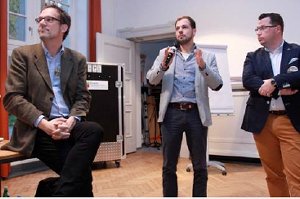 The gift we received from the community is that thanks to their funding, we could publish the movie on our website, for everyone to see, without having to go through classic film distribution channels. This way, we could make it as barrier-free as possible to share the film. Unlike most other productions, we don’t need to make money from cinemas. Only if you show the film in a commercial setting, like a consultant showing it to a client, or as a corporation, you’re asked to pay a personal one-time 60 EUR fee on our website, or a corporate fee as another option.
The gift we received from the community is that thanks to their funding, we could publish the movie on our website, for everyone to see, without having to go through classic film distribution channels. This way, we could make it as barrier-free as possible to share the film. Unlike most other productions, we don’t need to make money from cinemas. Only if you show the film in a commercial setting, like a consultant showing it to a client, or as a corporation, you’re asked to pay a personal one-time 60 EUR fee on our website, or a corporate fee as another option.
Marcella Bremer: How do you live now?
Ulf Brandes: I facilitate change at companies, I’m being invited to speak at events, I host dialogues and workshops, and I’m founding another company. I also develop a training program based on everything I have learned.
Every organization already has most of the resources they need to evolve – they “just” need to find them, and tap their potential
My deep belief is that every organization already has most of the resources they need to evolve – they “just” need to find them, and tap their potential. They don’t have to change everything, or to find lots of new employees. They can re-ignite the spirit, the purpose of why they work together. And they can create cultures and structures that encourage more mature behaviors, e.g. by reviewing their organizational norms and beliefs, and by offering workshops and opportunities for people to reflect and grow.
Leaving the 20th century behind now, I think we are ready and hungry to feel aliveness and connectedness – at work and home. It’s like a movement, and the movie feels right on time.
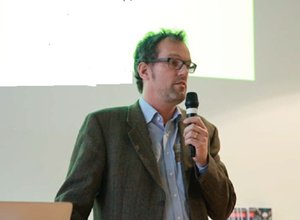
You can watch the movie with English subtitles at https://vimeo.com/122321254
English subtitles are available, thanks to fine people like Eike Brechlin and others who also work on more languages.
The general website is: https://augenhoehe-film.de/
Marcella Bremer is an author and culture & change consultant. She co-founded this blog and ocai-online.com.
